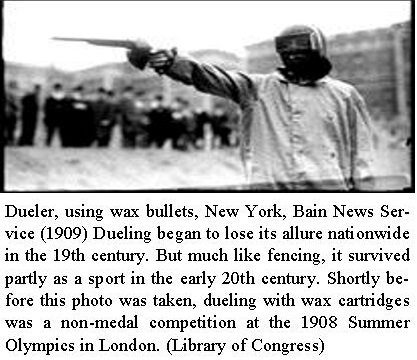squadron led by Commodore William Bainbridge. Decatur negotiated peace before Bainbridge could arrive, choosing glory over friendship, perhaps not understanding how hard Bainbridge would take the lost chance at glory.
Commodore Barron reappeared after his 10-year absence abroad, hoping to be reinstated in the Navy. His chances were slim, with three of the men who served on his court-martial now naval commissioners: Commodores David Porter, John Rodgers and Decatur. One of his few allies was Jesse Elliott, now a captain but once a midshipman on Barron’s ship when the British boarded, for which Barron was sent to court-martial. The Navy was willing to accept Barron’s service as sailing-master, in charge of the maintenance of ships, but Barron refused to accept the demotion, and Decatur refused to see Barron in his old rank of commodore. A series of letters between the two led to Barron challenging Decatur to a duel in 1819.
It would be 1820 before the details were finalized. Barron chose Elliott as his second. Decatur had a harder time finding a second. Many of his friends refused to serve, thinking this was an unnecessary dispute between one of the nation’s greatest commodores and a has-been. This was a problem — according to the Code Duello, the duelist’s second needed to be of similar rank. Had Decatur not finally found a second in Commodore William Bainbridge, who suspiciously arrived in town just as Decatur was getting desperate, the duel may not have occurred. Decatur’s wife, Susan, never trusted Bainbridge. In fact, after Decatur’s death, she never blamed Barron, the other duelist; she blamed Bainbridge and Elliott, believing they had connived a duel out of jealousy and malice toward Decatur.
Correspondence between Barron and Decatur before the duel supports Susan’s conspiracy theory. Barron’s second, Elliott, feared that the recently deceased Commodore Oliver Hazard Perry might have left behind documents from Decatur that somehow incriminated Elliott. Elliott had few friends in the Navy due to his cruelty toward his men (he kept his cat o’-nine-tails soaking in salt water to add to the brutality of lashing); Barron and Bainbridge were among his few allies. Bainbridge also had reason to be bitter. He had served as captain of Philadelphia, which was taken by Barbary pirates and later destroyed by Decatur in the heroic effort that earned him the rank of captain. Bainbridge also lost the chance for glory during the second Barbary War. His own ship had been delayed, allowing Decatur to arrive in the Mediterranean before he did and reach peace settlements with the Muslim leaders demanding tribute and taking Americans hostage.
Dueling was banned in the District of Columbia, so residents of the young nation’s capital generally went to Maryland, usually to the fields of Bladensburg, to duel. At the time, dying in a duel was unlikely. Flintlock pistols often misfired, and a misfire was considered a shot. Even when they did fire, accuracy was a problem with the smoothbore pistols. The duel Decatur and Barron fought required each man to aim before the duel began. Decatur announced his intention merely to wound Barron. The seconds measured the distance and loaded the pistols.
Code Duello dictated that all communication take place via the seconds. Barron, however, broke the Code Duello by speaking directly to Decatur;
&ldquolI hope that when we meet again, sir, that we should be friends.” “I have never thought of you as an enemy, sir,” responded Decatur.
It was the duty of the seconds to attempt reconciliation, even at this late juncture. But neither did. Instead, Bainbridge ordered the men to take aim. The men fired almost instantaneously. Barron fell, wounded in the hip. Decatur stood a few seconds, clutching his gut, color draining from his face, saying, “Oh Lord, I am a dead man.” He died just hours later. He was 41. Over three-fourths of the city of Washington attended the funeral of a naval hero who preserved his honor at the cost of his life.
[Source: Military History Magazine Janine Peterson
3 Jan 2019]
